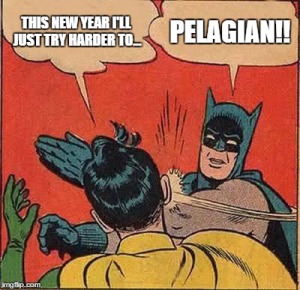I hope that you fail at your New Year’s resolutions.
Admittedly, I have never been much of one for New Year’s resolutions. I suspect, if I am being honest with myself, that one of the reasons for my avoidance is the security of knowing that if I don’t make a resolution I don’t have to fail at a resolution (or experience the unpleasant feelings of guilt and defeat that accompany repeatedly forgoing exercise for a Netflix binge). Now, I do appreciate and even envy folks that devise thoughtful and creative goals for the New Year. A fella over at Verily has written about some of his previous resolutions and they are both fun and creative. Anyway, I have been inspired to try resolutions this year. They are simple: exercise five days a week for at least 45 minutes, silent prayer for 30 minutes a day, and read one new non-school related book each month.
I hope that I fail at my New Year’s resolutions.

The Palagian heresy dealt with the belief that one could achieve salvation of their own accord without Christ. It seems that radical self-reliance is the root of Pelagianism, while Pelagianism expresses itself as radical self-reliance.
Let me be clear, I don’t hope that our New Year’s resolutions themselves fail. My friend Ed has written a nice post with great tips on ensuring that your resolutions are the type that increase your likelihood of success in achieving them. Only, I hope that we, of ourselves, fail in keeping our resolutions.
Thinking about the concept of resolutions as a Catholics there is, perhaps, no clearer or more explicit example than can be found in the Act of Contrition. We say:
O my God, I am heartily sorry for having offended Thee, and I detest all my sins because of Thy just punishments, but most of all because they offend Thee, my God, Who art all-good and deserving of all my love. I firmly resolve, with the help of Thy grace, to sin no more and to avoid the near occasions of sin.
In this prayer we make the resolution to sin no more and avoid occasions of sin. The key, however, is that this resolution is made and accomplished with the help of God’s grace. We do not rely merely on ourselves. We cannot rely merely upon ourselves. We depend upon God. I hope we fail at our resolutions this year because we often only realize the extent of our need to trust and depend upon God when our self-reliance fails us. We can speak of depending upon God with our lips, but live far away from the reality in our hearts; in our failures the veil of self-deception is lifted. I am certainly not saying that we should not have self-esteem or confidence in our ability to handle life’s challenges and situations. We should. It’s healthy. But, sometimes self-reliance masquerades as self-esteem and self-confidence. Our confidence and esteem should never draw us away from our trust and dependence on Christ, but rather move us more into His compassionate care.
Self-reliance runs contrary to the notion of receiving gifts. In our self-reliance we have no need for gifts, but rather try to wrestle from life what we desire. Eventually we are left feeling emotionally exhausted and spiritually bankrupt. So much of God’s economy depends on our willingness to receive His gifts. What gifts might we be missing or failing to see because of the blindness caused by our self-reliance? Often, the limits of our self-reliance are most obvious on those occasions when life has beaten us down to our knees. I’d like to suggest that sometimes, rather than exercising the psychological and emotional energy to pull ourselves up by the bootstraps, it can often be liberating to simply stay on our knees and let go of some of our self-reliance.
Lessons from our Knees:
 The Grace of Suffering. Looking out over the upcoming year from this place on our knees we can see the Cross–death and love. This is not to be morbid or heavy-handed. Regardless of whether we experience material successes, social gains, family joys, or other personal happiness the Cross is the one sure reality of the upcoming year. Whether it comes in the form of loneliness, loss, sadness, defeat, worry, abandonment, fear, affliction, or rejection our crosses await us. This may be the hardest year emotionally, physically, psychologically, and/or spiritually for some of us, we can meet one another in the universal experience of suffering and find grace. The Cross is grace, but we push back against this grace because grace changes us and change is often painful and scary. To try and diminish the Cross with a “sugary slice of inspirational pie” (as Flannery O’Conner used to call it) is to miss the point. To the world only fools kiss their cross, but we can embrace ours because each cross offers a diminishment of our false selves and a transforming encounter with Christ. In the hour in which He cried out to the Father asking why He had been abandoned, Christ shows us that He goes to those places of suffering and abandonment, of loneliness and affliction, and waits there for us.
The Grace of Suffering. Looking out over the upcoming year from this place on our knees we can see the Cross–death and love. This is not to be morbid or heavy-handed. Regardless of whether we experience material successes, social gains, family joys, or other personal happiness the Cross is the one sure reality of the upcoming year. Whether it comes in the form of loneliness, loss, sadness, defeat, worry, abandonment, fear, affliction, or rejection our crosses await us. This may be the hardest year emotionally, physically, psychologically, and/or spiritually for some of us, we can meet one another in the universal experience of suffering and find grace. The Cross is grace, but we push back against this grace because grace changes us and change is often painful and scary. To try and diminish the Cross with a “sugary slice of inspirational pie” (as Flannery O’Conner used to call it) is to miss the point. To the world only fools kiss their cross, but we can embrace ours because each cross offers a diminishment of our false selves and a transforming encounter with Christ. In the hour in which He cried out to the Father asking why He had been abandoned, Christ shows us that He goes to those places of suffering and abandonment, of loneliness and affliction, and waits there for us.
Death. Looking out over the upcoming year from this place on our knees we can see the Cross. This Cross is death—both the necessary death to self that we are invited to embrace and the inevitable death of the flesh. Honestly acknowledging the reality of our death can make each moment more meaningful. It can spur us to live more authentically, taking noble risks with our loves and our fears. Dance with death this year—not the Foxtrot, but the tango. Pull it close. Think about it. Meditated on it. Talk about it. Let its reality breath into your life and sift away what is frivolous or born of fear. Let it make you bold, courageous, and holy.
Love. Looking out over the upcoming year from this place on our knees we can see the Cross. On that Cross is Love’s lesson. Recently, a Jesuit friend of mine noted that he thought that Pope emeritus Benedict was a “great lover.” I am apt to agree. I think one need only sit with his writings for a while before the heart of one who has learned to love deeply emerges. I want to be a great lover. I like the phrase “great lover” mostly for the ambiguity of the English; not only does it imply that one is adept at willing the good of the other, but there is also a sense of passionate, romantic spousal love. This passionate spousal love permeates the writings of the great Mystics of the Church, who often found this analogous language most fitting to describe God’s action and union with the soul. Strive to be a better lover this year. Diminishing our self-reliance at the foot of the Cross opens us to the lessons of Love and allows us to draw from the Divine wellspring of Love, rather than our own human stores.
It is my prayer for myself and all that read this blog that this year be one in which we all stay on our knees. Rather than allowing our failures and botched resolutions to distress and defeat us may we embrace them as opportunities to acknowledge the deficiency of our self-reliance (in all its various and subtle forms) and turn to the help of His grace. From our knees may we receive the many gifts that Jesus has prepared for us. May we meet our crosses–our traumas, our fears, our abandonment, our afflictions, and oursadness—allowing them to become moments of life changing grace. How will you try to diminish self-reliance in this upcoming year?
As for this blog, we are excited for the start of the New Year. We are working on a video series on scrupulosity. We will be also be tackling pertinent topics such as coping with depression, seasonal affective disorder, and recognizing and combating your common thinking distortions. Get psyched because we have some great stuff coming!
Nice work, Matt!
What we do (or don’t do) is important …for this life. But as far as our relationship goes with the One who died for the likes of us resolution breakers…what we ‘do’…is not the point. But it is what He has done, that is precisely the point.
Great job!
Happy New Year!
Thanks Steve! I took a look at your site. I really like the name. Happy New Year as well.